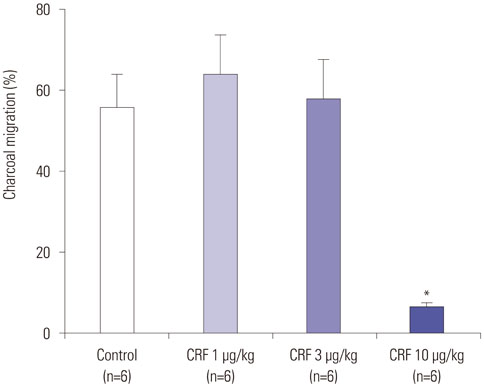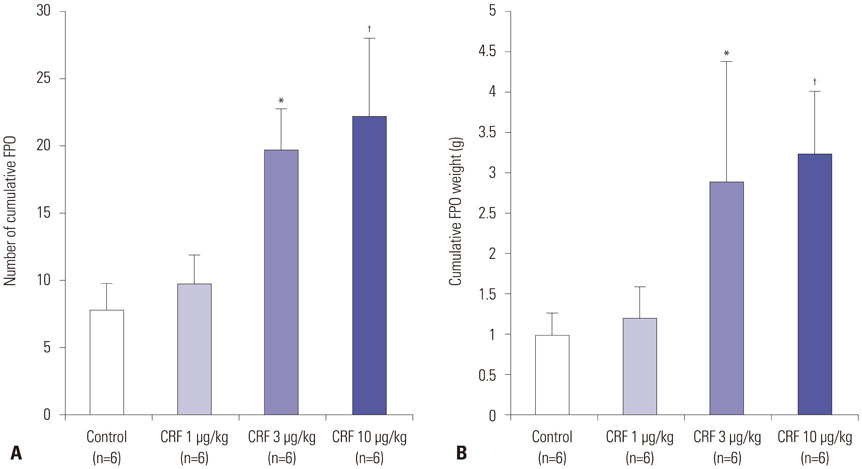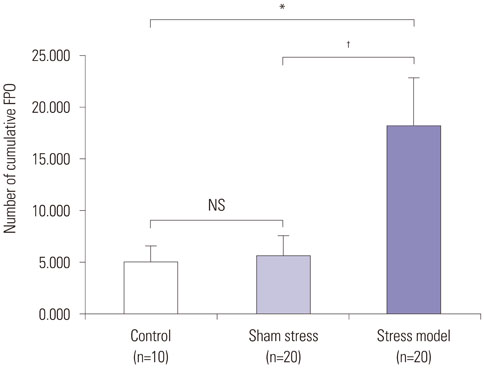Yonsei Med J.
2017 Jul;58(4):872-877. 10.3349/ymj.2017.58.4.872.
The Effect of Peripheral CRF Peptide and Water Avoidance Stress on Colonic and Gastric Transit in Guinea Pigs
- Affiliations
-
- 1Department of Internal Medicine, Gangnam Severance Hospital, Yonsei University College of Medicine, Seoul, Korea. hjpark21@yuhs.ac
- KMID: 2419097
- DOI: http://doi.org/10.3349/ymj.2017.58.4.872
Abstract
- Functional dyspepsia (FD) and irritable bowel syndrome (IBS) are common gastrointestinal (GI) diseases; however, there is frequent overlap between FD and IBS patients. Emerging evidence links the activation of corticotropin releasing factor (CRF) receptors with stress-related alterations of gastric and colonic motor function. Therefore, we investigated the effect of peripheral CRF peptide and water avoidance stress (WAS) on upper and lower GI transit in guinea pigs. Dosages 1, 3, and 10 µg/kg of CRF were injected intraperitoneally (IP) in fasted guinea pigs 30 minutes prior to the intragastric administration of charcoal mix to measure upper GI transit. Colonic transits in non-fasted guinea pigs were assessed by fecal pellet output assay after above IP CRF doses. Blockade of CRF receptors by Astressin, and its effect on GI transit was also analyzed. Guinea pigs were subjected to WAS to measure gastrocolonic transit in different sets of experiments. Dose 10 µg/kg of CRF significantly inhibited upper GI transit. In contrast, there was dose dependent acceleration of the colonic transit. Remarkably, pretreatment of astressin significantly reverses the effect of CRF peptide on GI transit. WAS significantly increase colonic transit, but failed to accelerate upper GI transit. Peripheral CRF peptide significantly suppressed upper GI transit and accelerated colon transit, while central CRF involved WAS stimulated only colonic transit. Therefore, peripheral CRF could be utilized to establish the animal model of overlap syndrome.
Keyword
MeSH Terms
-
Animals
Colon/drug effects/*physiopathology
Corticotropin-Releasing Hormone/*pharmacology
Dehydration/*physiopathology
Gastrointestinal Transit/*drug effects
Guinea Pigs
Male
Peptide Fragments/pharmacology
Peptides/*pharmacology
Receptors, Corticotropin-Releasing Hormone/metabolism
Peptide Fragments
Peptides
Receptors, Corticotropin-Releasing Hormone
Corticotropin-Releasing Hormone
Figure
Reference
-
1. Ford AC, Marwaha A, Lim A, Moayyedi P. Systematic review and meta-analysis of the prevalence of irritable bowel syndrome in individuals with dyspepsia. Clin Gastroenterol Hepatol. 2010; 8:401–409.
Article2. Kaji M, Fujiwara Y, Shiba M, Kohata Y, Yamagami H, Tanigawa T, et al. Prevalence of overlaps between GERD, FD and IBS and impact on health-related quality of life. J Gastroenterol Hepatol. 2010; 25:1151–1156.
Article3. Talley NJ, Dennis EH, Schettler-Duncan VA, Lacy BE, Olden KW, Crowell MD. Overlapping upper and lower gastrointestinal symptoms in irritable bowel syndrome patients with constipation or diarrhea. Am J Gastroenterol. 2003; 98:2454–2459.
Article4. Agréus L, Svärdsudd K, Nyrén O, Tibblin G. Irritable bowel syndrome and dyspepsia in the general population: overlap and lack of stability over time. Gastroenterology. 1995; 109:671–680.
Article5. Caballero-Plasencia AM, Sofos-Kontoyannis S, Valenzuela-Barranco M, Martín-Ruiz JL, Casado-Caballero FJ, López-Mañas JG. Irritable bowel syndrome in patients with dyspepsia: a community-based study in southern Europe. Eur J Gastroenterol Hepatol. 1999; 11:517–522.6. Mayer EA, Craske M, Naliboff BD. Depression, anxiety, and the gastrointestinal system. J Clin Psychiatry. 2001; 62:Suppl 8. 28–36.7. Levy RL, Olden KW, Naliboff BD, Bradley LA, Francisconi C, Drossman DA, et al. Psychosocial aspects of the functional gastrointestinal disorders. Gastroenterology. 2006; 130:1447–1458.
Article8. Corsetti M, Caenepeel P, Fischler B, Janssens J, Tack J. Impact of coexisting irritable bowel syndrome on symptoms and pathophysiological mechanisms in functional dyspepsia. Am J Gastroenterol. 2004; 99:1152–1159.
Article9. Tack J, Demedts I, Dehondt G, Caenepeel P, Fischler B, Zandecki M, et al. Cinical and pathophysiological characteristics of acute-onset functional dyspepsia. Gastroenterology. 2002; 122:1738–1747.
Article10. Chang L. The role of stress on physiologic responses and clinical symptoms in irritable bowel syndrome. Gastroenterology. 2011; 140:761–765.
Article11. Caso JR, Leza JC, Menchén L. The effects of physical and psychological stress on the gastro-intestinal tract: lessons from animal models. Curr Mol Med. 2008; 8:299–312.
Article12. Taché Y, Martinez V, Million M, Wang L. Stress and the gastrointestinal tract III. Stress-related alterations of gut motor function: role of brain corticotropin-releasing factor receptors. Am J Physiol Gastrointest Liver Physiol. 2001; 280:G173–G177.13. Taché Y, Martinez V, Wang L, Million M. CRF1 receptor signaling pathways are involved in stress-related alterations of colonic function and viscerosensitivity: implications for irritable bowel syndrome. Br J Pharmacol. 2004; 141:1321–1330.
Article14. Bonaz B, Taché Y. Water-avoidance stress-induced c-fos expression in the rat brain and stimulation of fecal output: role of corticotropin-releasing factor. Brain Res. 1994; 641:21–28.
Article15. Bradesi S, Schwetz I, Ennes HS, Lamy CM, Ohning G, Fanselow M, et al. Repeated exposure to water avoidance stress in rats: a new model for sustained visceral hyperalgesia. Am J Physiol Gastrointest Liver Physiol. 2005; 289:G42–G53.
Article16. Nozu T, Kumei S, Takakusaki K, Okumura T. Water-avoidance stress enhances gastric contractions in freely moving conscious rats: role of peripheral CRF receptors. J Gastroenterol. 2014; 49:799–805.
Article17. Bale TL, Vale WW. CRF and CRF receptors: role in stress responsivity and other behaviors. Annu Rev Pharmacol Toxicol. 2004; 44:525–557.
Article18. Taché Y, Million M. Central corticotropin-releasing factor and the hypothalamic-pituitary-adrenal axis in gastrointestinal physiology. In : Johnson LR, Barrett KE, Merchant JL, Ghishan FK, Said HM, Wood JD, editors. Physiology of the gastrointestinal tract. 4th ed. Burlington: Elsevier Academic Press;2006. p. 791–816.19. Kawahito Y, Sano H, Mukai S, Asai K, Kimura S, Yamamura Y, et al. Corticotropin releasing hormone in colonic mucosa in patients with ulcerative colitis. Gut. 1995; 37:544–551.
Article20. Liu S, Gao X, Gao N, Wang X, Fang X, Hu HZ, et al. Expression of type 1 corticotropin-releasing factor receptor in the guinea pig enteric nervous system. J Comp Neurol. 2005; 481:284–298.
Article21. Porcher C, Juhem A, Peinnequin A, Sinniger V, Bonaz B. Expression and effects of metabotropic CRF1 and CRF2 receptors in rat small intestine. Am J Physiol Gastrointest Liver Physiol. 2005; 288:G1091–G1103.22. Chatzaki E, Crowe PD, Wang L, Million M, Taché Y, Grigoriadis DE. CRF receptor type 1 and 2 expression and anatomical distribution in the rat colon. J Neurochem. 2004; 90:309–316.
Article23. Taché Y, Perdue MH. Role of peripheral CRF signalling pathways in stress-related alterations of gut motility and mucosal function. Neurogastroenterol Motil. 2004; 16:Suppl 1. 137–142.
Article24. Williams CL, Peterson JM, Villar RG, Burks TF. Corticotropin-releasing factor directly mediates colonic responses to stress. Am J Physiol. 1987; 253(4 Pt 1):G582–G586.
Article25. Martínez V, Wang L, Rivier JE, Vale W, Taché Y. Differential actions of peripheral corticotropin-releasing factor (CRF), urocortin II, and urocortin III on gastric emptying and colonic transit in mice: role of CRF receptor subtypes 1 and 2. J Pharmacol Exp Ther. 2002; 301:611–617.
Article26. Maillot C, Million M, Wei JY, Gauthier A, Taché Y. Peripheral corticotropin-releasing factor and stress-stimulated colonic motor activity involve type 1 receptor in rats. Gastroenterology. 2000; 119:1569–1579.
Article27. Miwa H, Koseki J, Oshima T, Hattori T, Kase Y, Kondo T, et al. Impairment of gastric accommodation induced by water-avoidance stress is mediated by 5-HT2B receptors. Neurogastroenterol Motil. 2016; 28:765–778.
Article28. Enck P, Merlin V, Erckenbrecht JF, Wienbeck M. Stress effects on gastrointestinal transit in the rat. Gut. 1989; 30:455–459.
Article29. Nastaskin I, Mehdikhani E, Conklin J, Park S, Pimentel M. Studying the overlap between IBS and GERD: a systematic review of the literature. Dig Dis Sci. 2006; 51:2113–2120.
Article30. Wang A, Liao X, Xiong L, Peng S, Xiao Y, Liu S, et al. The clinical overlap between functional dyspepsia and irritable bowel syndrome based on Rome III criteria. BMC Gastroenterol. 2008; 8:43.
Article31. Lee HJ, Lee SY, Kim JH, Sung IK, Park HS, Jin CJ, et al. Depressive mood and quality of life in functional gastrointestinal disorders: differences between functional dyspepsia, irritable bowel syndrome and overlap syndrome. Gen Hosp Psychiatry. 2010; 32:499–502.
Article32. Park JM, Choi MG, Cho YK, Lee IS, Kim JI, Kim SW, et al. Functional gastrointestinal disorders diagnosed by Rome III questionnaire in Korea. J Neurogastroenterol Motil. 2011; 17:279–286.
Article33. Park H. Functional gastrointestinal disorders and overlap syndrome in Korea. J Gastroenterol Hepatol. 2011; 26:Suppl 3. 12–14.
Article34. Martínez V, Wang L, Rivier J, Grigoriadis D, Taché Y. Central CRF, urocortins and stress increase colonic transit via CRF1 receptors while activation of CRF2 receptors delays gastric transit in mice. J Physiol. 2004; 556(Pt 1):221–234.
Article35. Taché Y, Bonaz B. Corticotropin-releasing factor receptors and stress-related alterations of gut motor function. J Clin Invest. 2007; 117:33–40.
Article36. Martínez V, Rivier J, Taché Y. Peripheral injection of a new corticotropin-releasing factor (CRF) antagonist, astressin, blocks peripheral CRF- and abdominal surgery-induced delayed gastric emptying in rats. J Pharmacol Exp Ther. 1999; 290:629–634.37. Gourcerol G, Wu SV, Yuan PQ, Pham H, Miampamba M, Larauche M, et al. Activation of corticotropin-releasing factor receptor 2 mediates the colonic motor coping response to acute stress in rodents. Gastroenterology. 2011; 140:1586–1596.e6.
Article38. Nozu T, Tsuchiya Y, Kumei S, Takakusaki K, Okumura T. Peripheral corticotropin-releasing factor (CRF) induces stimulation of gastric contractions in freely moving conscious rats: role of CRF receptor types 1 and 2. Neurogastroenterol Motil. 2013; 25:190–197.
Article39. Stengel A, Taché Y. Neuroendocrine control of the gut during stress: corticotropin-releasing factor signaling pathways in the spotlight. Annu Rev Physiol. 2009; 71:219–239.
Article40. Mönnikes H, Schmidt BG, Taché Y. Psychological stress-induced accelerated colonic transit in rats involves hypothalamic corticotropin-releasing factor. Gastroenterology. 1993; 104:716–723.
Article
- Full Text Links
- Actions
-
Cited
- CITED
-
- Close
- Share
- Similar articles
-
- The Effect of Trimebutine on the Overlap Syndrome Model of Guinea Pigs
- The Effect of Caffeine, Theophylline and Adenosine on the Colonic Transit Time of Guinea Pigs
- Altered Colonic Motor Functions in Experimental Colitis of Guinea Pigs
- Changes in Colonic Transit and Contractility of Muscle According to The Time Course in TNBS-Induced Colitis
- Altered Colonic Transit in TNBS-induced Experimental Colitis in Guinea Pig and Distribution of Nitric Oxide Synthase in the Colonic Wall







